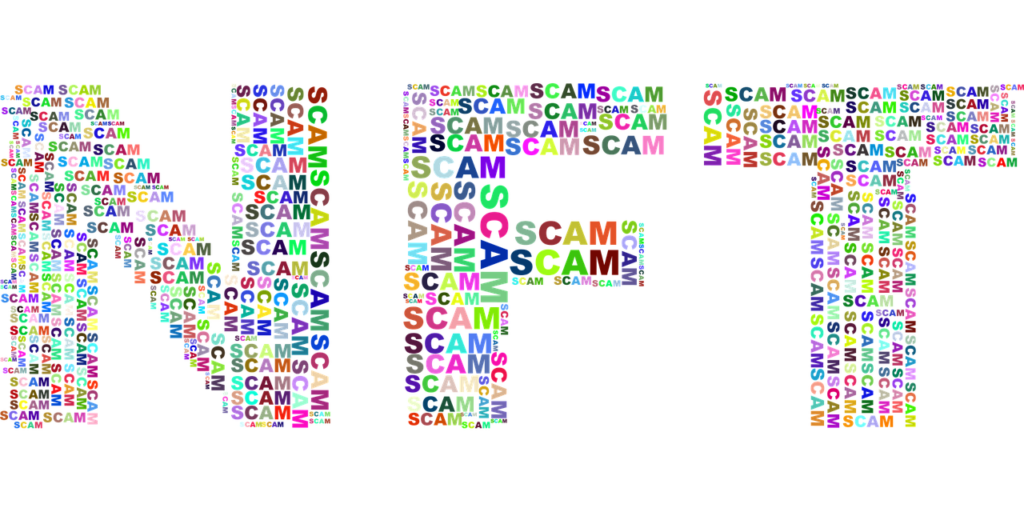100 Examples of how each of these industries can potentially use NFTs

Here are 100 examples of how each of these industries can potentially use NFTs:
- Art: NFTs can be used to sell digital artwork, authenticate physical artwork, and track the ownership of artwork.
- Music: NFTs can be used to sell unique music tracks, concert tickets, merchandise, and prove ownership of music copyrights and royalties.
- Gaming: NFTs can be used to create unique in-game items that players can own and trade, as well as to represent ownership of game assets and in-game real estate.
- Sports: NFTs can be used to sell collectibles, represent ownership of sports-related assets such as season tickets, merchandise, and memorabilia.
- Fashion: NFTs can be used to sell unique digital fashion items, such as virtual clothing and accessories.
- Real Estate: NFTs can be used to represent ownership of real estate, making it easier to transfer ownership and prove the authenticity of the property.
- Education: NFTs can be used to represent ownership of educational certificates and credentials, making it easier to verify the authenticity of the qualifications.
- Charity: NFTs can be used to create unique digital collectibles that can be sold to raise funds for charitable causes.
- Film: NFTs can be used to sell limited edition digital copies of films or represent ownership of the film rights.
- TV: NFTs can be used to sell limited edition digital copies of TV shows or represent ownership of the show rights.
- Literature: NFTs can be used to sell limited edition digital copies of books or represent ownership of the book rights.
- Comics: NFTs can be used to sell limited edition digital copies of comics or represent ownership of the comic book rights.
- Photography: NFTs can be used to sell unique digital photos and prove ownership of the photographs.
- Cryptocurrency: NFTs can be used to represent ownership of digital assets such as cryptocurrency, making it easier to track and transfer ownership.
- Trading cards: NFTs can be used to create unique digital trading cards that can be owned and traded by collectors.
- Collectibles: NFTs can be used to create unique digital collectibles that can be owned and traded by collectors.
- Memorabilia: NFTs can be used to sell unique digital memorabilia items, such as autographs, and prove ownership of the item.
- Virtual events: NFTs can be used to sell tickets to virtual events and provide access to exclusive event merchandise.
- Ticketing: NFTs can be used to represent ownership of event tickets and prevent fraud and counterfeit tickets.
- Social media: NFTs can be used to sell unique digital social media content, such as tweets, and prove ownership of the content.
- Branding: NFTs can be used to represent ownership of branding and trademark rights.
- Advertising: NFTs can be used to sell unique digital advertising space and represent ownership of the advertising rights.
- Digital identity: NFTs can be used to represent ownership of digital identities, such as usernames and social media handles.
- Travel: NFTs can be used to sell unique digital travel experiences, such as virtual tours and travel guides.
- Tourism: NFTs can be used to sell unique digital tourism experiences, such as virtual tours and travel guides.
- Food and beverage: NFTs can be used to sell unique digital food and beverage experiences, such as virtual cooking classes.
- Health and wellness: NFTs can be used to sell unique digital health and wellness experiences, such as virtual fitness classes.
- Fitness: NFTs can be used to sell unique digital fitness
29. Beauty: NFTs can be used to sell unique digital beauty experiences, such as virtual makeup tutorials.
30. Augmented reality: NFTs can be used to create unique augmented reality experiences that can be owned and traded by collectors.
31. Virtual reality: NFTs can be used to sell unique virtual reality experiences that can be owned and traded by collectors.
32. Podcasts: NFTs can be used to sell limited edition digital copies of podcasts or represent ownership of the podcast rights.
33. Comedy: NFTs can be used to sell limited edition digital copies of comedy shows or represent ownership of the comedy rights.
34. Theater: NFTs can be used to sell limited edition digital copies of theater performances or represent ownership of the theater rights.
35. Dance: NFTs can be used to sell limited edition digital copies of dance performances or represent ownership of the dance rights.
36. Magic: NFTs can be used to sell limited edition digital copies of magic shows or represent ownership of the magic rights.
37. Circus: NFTs can be used to sell limited edition digital copies of circus performances or represent ownership of the circus rights.
38. Theme parks: NFTs can be used to sell unique digital theme park experiences, such as virtual tours and ride experiences.
39. Museums: NFTs can be used to sell unique digital museum experiences, such as virtual tours and access to exclusive exhibitions.
40. Galleries: NFTs can be used to sell unique digital gallery experiences, such as virtual exhibitions and access to exclusive artworks.
41. Luxury goods: NFTs can be used to sell unique digital luxury goods, such as virtual watches and jewelry.
42. Cars: NFTs can be used to represent ownership of unique cars, making it easier to transfer ownership and prove the authenticity of the vehicle.
43. Aviation: NFTs can be used to sell unique digital aviation experiences, such as virtual tours of planes and airports.
44. Shipping: NFTs can be used to represent ownership of shipping containers and cargo, making it easier to track and transfer ownership.
45. Energy: NFTs can be used to represent ownership of energy assets, such as renewable energy certificates and carbon credits.
46. Infrastructure: NFTs can be used to represent ownership of infrastructure assets, such as toll roads and bridges.
47. Mining: NFTs can be used to represent ownership of mining assets, such as mineral rights and mining equipment.
48. Agriculture: NFTs can be used to represent ownership of agricultural assets, such as farmland and crops.
49. Fishing: NFTs can be used to represent ownership of fishing assets, such as fishing boats and fishing rights.
50. Real estate development: NFTs can be used to represent ownership of real estate development projects, making it easier to track ownership and distribute profits.
51. Construction: NFTs can be used to represent ownership of construction assets, such as cranes and scaffolding.
52. Engineering: NFTs can be used to represent ownership of engineering assets, such as patents and intellectual property.
53. Architecture: NFTs can be used to sell unique digital architecture designs, such as virtual building models.
54. Interior design: NFTs can be used to sell unique digital interior design concepts, such as virtual room designs.
55. Home improvement: NFTs can be used to sell unique digital home improvement concepts, such as virtual remodeling plans.
56. Home automation: NFTs can be used to sell unique digital home automation concepts, such as virtual smart home configurations.
57. Smart cities: NFTs can be used to represent ownership of smart city assets, such as traffic lights and
57. Smart cities: NFTs can be used to represent ownership of smart city assets, such as traffic lights and IoT devices.
58. Insurance: NFTs can be used to represent ownership of insurance policies and claim rights.
59. Legal: NFTs can be used to represent ownership of legal assets, such as contracts and patents.
60. Taxation: NFTs can be used to represent ownership of tax credits and deductions.
61. Healthcare: NFTs can be used to represent ownership of medical records and treatment rights.
62. Fitness: NFTs can be used to sell unique digital fitness experiences, such as virtual workout programs.
63. Sports betting: NFTs can be used to represent ownership of sports betting rights, making it easier to track and transfer ownership.
64. Fantasy sports: NFTs can be used to represent ownership of fantasy sports teams and players.
65. Esports: NFTs can be used to sell unique digital esports experiences, such as virtual tournaments and gaming gear.
66. Music festivals: NFTs can be used to sell unique digital music festival experiences, such as virtual access to concerts and backstage passes.
67. Nightclubs: NFTs can be used to sell unique digital nightclub experiences, such as virtual access to VIP areas and exclusive events.
68. Bars: NFTs can be used to sell unique digital bar experiences, such as virtual access to tasting events and private parties.
69. Liquor: NFTs can be used to sell unique digital liquor experiences, such as virtual tastings and limited edition releases.
70. Cigars: NFTs can be used to sell unique digital cigar experiences, such as virtual tastings and access to rare releases.
71. Coffee: NFTs can be used to sell unique digital coffee experiences, such as virtual tastings and access to rare blends.
72. Tea: NFTs can be used to sell unique digital tea experiences, such as virtual tastings and access to rare blends.
73. Gourmet food: NFTs can be used to sell unique digital gourmet food experiences, such as virtual tastings and access to rare ingredients.
74. Travel: NFTs can be used to sell unique digital travel experiences, such as virtual tours of exotic locations and access to exclusive travel deals.
75. Home-sharing: NFTs can be used to represent ownership of home-sharing rights, making it easier to track and transfer ownership of properties used for home-sharing.
76. Ride-sharing: NFTs can be used to represent ownership of ride-sharing rights, making it easier to track and transfer ownership of vehicles used for ride-sharing.
77. Parking: NFTs can be used to represent ownership of parking rights, making it easier to track and transfer ownership of parking spaces and garages.
78. Real estate: NFTs can be used to represent ownership of real estate assets, making it easier to track and transfer ownership of properties.
79. Art: NFTs are already being used to represent ownership of digital art, and they could be used to represent ownership of physical artwork as well.
80. Collectibles: NFTs can be used to represent ownership of collectibles, such as trading cards, stamps, and coins.
81. Fashion: NFTs can be used to sell unique digital fashion experiences, such as virtual fashion shows and access to limited edition designs.
82. Luxury goods: NFTs can be used to sell unique digital luxury experiences, such as virtual tours of high-end retailers and access to exclusive products.
83. Toys: NFTs can be used to represent ownership of toys, such as limited edition figurines and action figures.
84. Gaming: NFTs can be used to represent ownership of in-game assets, such as virtual currency and rare items.
85. Education: NFTs can be used to represent ownership of educational content, such as digital courses and online tutoring sessions.
86. Podcasts: NFTs can be used to represent ownership of podcast episodes and sponsorships.
87. News: NFTs can be used to represent ownership of news articles and exclusive interviews.
88. Social media: NFTs can be used to represent ownership of social media content, such as tweets and Instagram posts.
89. Influencers: NFTs can be used to represent ownership of influencer collaborations and sponsored content.
90. Advertising: NFTs can be used to represent ownership of advertising campaigns and creative assets.
91. Marketing: NFTs can be used to represent ownership of marketing campaigns and promotional materials.
92. Public relations: NFTs can be used to represent ownership of public relations campaigns and media outreach.
93. Event planning: NFTs can be used to sell unique digital event planning experiences, such as virtual access to conferences and trade shows.
94. Catering: NFTs can be used to sell unique digital catering experiences, such as virtual tastings and access to exclusive menus.
95. Weddings: NFTs can be used to sell unique digital wedding experiences, such as virtual access to bridal shows and personalized wedding planning services.
96. Health and wellness: NFTs can be used to sell unique digital health and wellness experiences, such as virtual access to wellness retreats and personalized nutrition coaching.
97. Beauty: NFTs can be used to sell unique digital beauty experiences, such as virtual makeup consultations and access to exclusive beauty products.
98. Pet care: NFTs can be used to sell unique digital pet care experiences, such as virtual consultations with veterinarians and access to rare pet products.
99. Gaming hardware: NFTs can be used to represent ownership of gaming hardware, such as rare and limited edition consoles and peripherals.
100. Cryptocurrency: NFTs can be used to represent ownership of cryptocurrency, making it easier to track and transfer ownership of digital assets.Here are 100 examples of how each of these industries can potentially use NFTs:
Jay Koh
www.Web3Matters.net







Responses